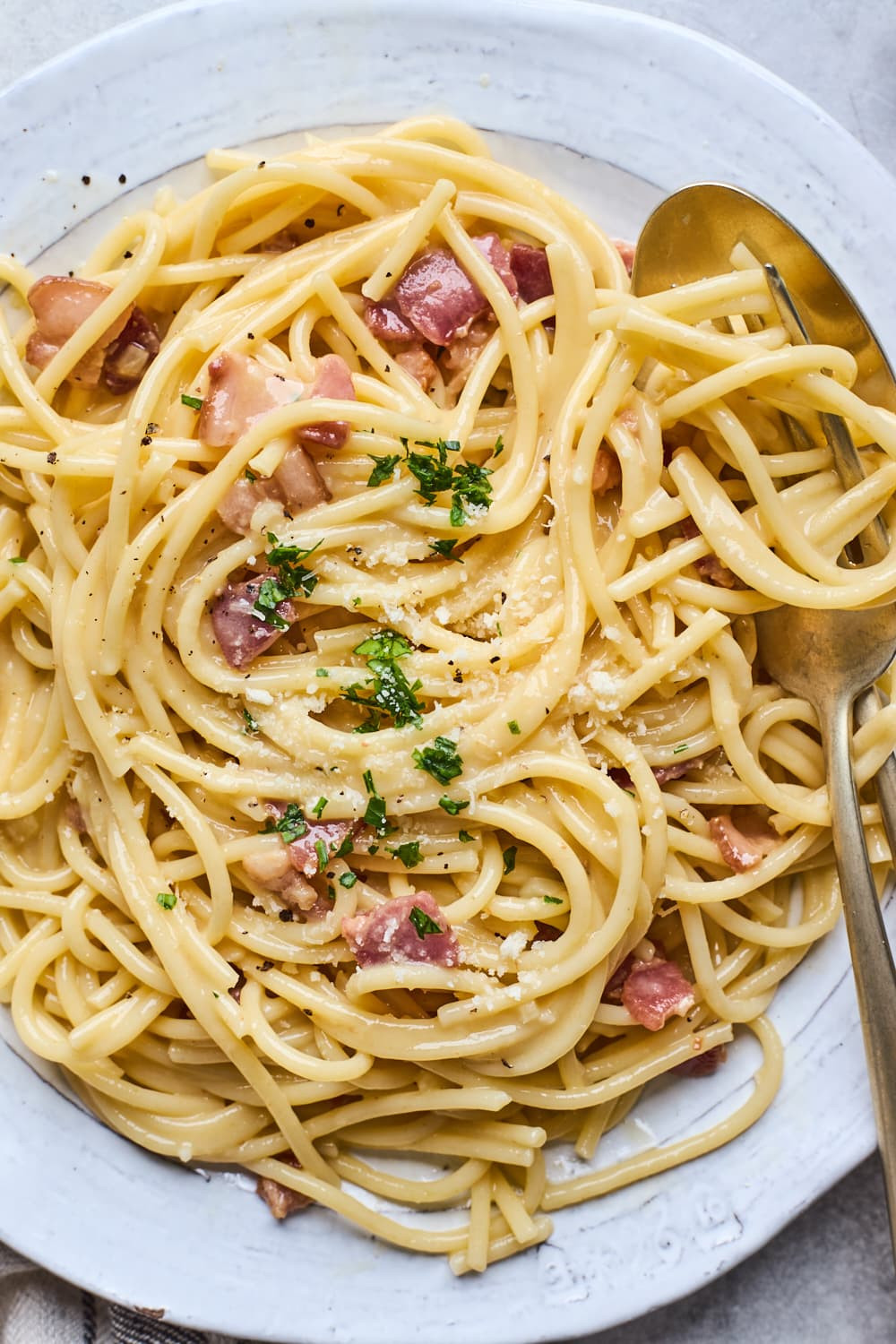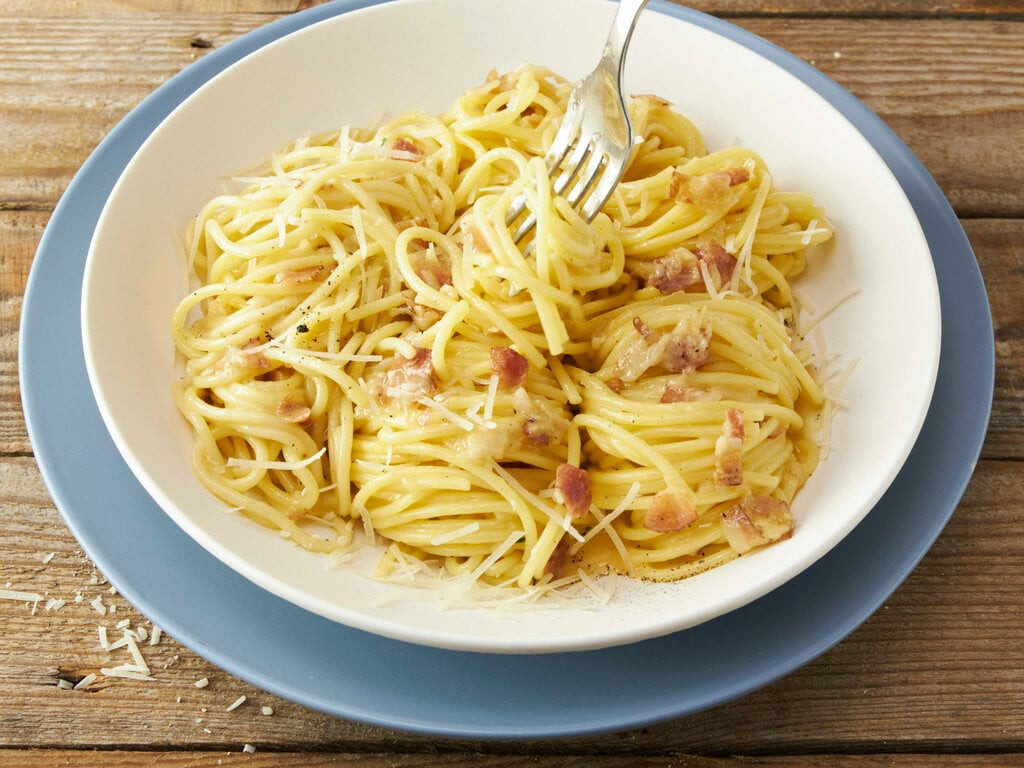As the company behind spaghetti hoops, Alphabetti and Minions pasta shapes, Heinz is not afraid to take liberties with Italian cuisine. But after it had the audacity to put carbonara in a can, some fear the US manufacturer has gone too far. The seriousness of the situation became apparent on Thursday morning when the company’s first pasta launch in a decade was discussed on BBC Radio 4’s agenda-setting Today news programme. The presenter Jonny Dymond asked whether it amounted to the “end of culinary civilisation” or the kind of “leap forward that brought us the joy of Pot Noodles and microwave meals”.
Alessandro Pipero, whose Michelin-starred Pipero restaurant in the heart of Rome has earned him the billing “carbonara king”, was firmly in the first camp. The chef appeared to recoil at £2 supermarket carbonara with a lengthy shelf life, quizzically asking: “Do you mean in a tin, like cat food?” He told the Times: “I don’t really know how to respond to this, shouldn’t we stick to putting things like Coca-Cola in a can?”
The US manufacturer is indeed selling the spaghetti dish in a tin – like cat food, as one Italian maître put it. Heinz has angered Italians by putting spaghetti carbonara in a tin, with the new product being called a “disgrace”. The dish, comprising spaghetti and pancetta in a creamy sauce, is the first tinned pasta product released by the US brand in more than a decade. It will be available in British supermarkets from September.
Why the Fury? The 'Bastardization' of a Beloved Dish
The launch of Heinz’s tinned carbonara comes at a time when the company is trying to win over Generation Z consumers who want their food to be fast and convenient. However, the move has outraged Italian chefs and restaurant managers, who claim it is not “authentic carbonara”. Cristina Bowerman, a Michelin-star chef who owns the Glass restaurant in Rome, said it was impossible to produce carbonara in a tin and described it as “a bastardization” of one of the country’s most beloved dishes.
“There is no way spaghetti carbonara can be handled in a can,” Ms Bowerman told The Telegraph. “I am totally against it. It’s a bastardization.” She said the majority of pastas, including spaghetti, could not be prepared in advance and the timing required to produce a tasty carbonara was quite particular.
“If you get to eat the real carbonara, there is no way you will be satisfied with one in a can,” she said.
Moreno Cedroni, a Michelin-star chef who has three restaurants near Ancona on the Adriatic Coast, also questioned how carbonara could be served in a can, while noting Heinz was the same company that bottled mayonnaise and ketchup.
“We are a country accustomed to preparing our dishes according to tradition and we are always among the best,” he said. “I don’t think this will be successful, I certainly wouldn’t buy it. But the market will decide.”
Aldo Zilli, who became one of Britain’s best loved Italian chefs after moving here at the age of 20, told The Telegraph he was “appalled” at the idea of spaghetti carbonara in a can.
“What is going on with the world? They must be mad putting the beauty and simplicity of a dish like carbonara in a can,” he said. “Heinz pasta hoops in a tin were fun at least. This sounds disgusting.”
A Dish's History
While Romans like to claim spaghetti carbonara as one of their own, its origins are hotly disputed. The dish has been eaten throughout central Italy over the years but according to local legend, it became a Roman staple after being popularised by American soldiers when they liberated the Italian capital in 1944. Although now considered a staple Italian dish, spaghetti carbonara is a relatively recent invention. Its origins are debated but food writers suggest that it may have come from US troops in Italy and their daily supplies, which included some sort of cheese, bacon and eggs.
The dish’s enduring popularity is partly the fact it is, in theory, quick and easy to prepare and has just four ingredients – pasta, egg, parmesan and pancetta. Some cooks add cream but may keep quiet about it after the chef Nigella Lawson was criticised for causing the “death of Italian food” by including 60ml of double cream in a 2017 recipe. Those who get shirty about the addition of cream should skip the ingredients list on the back of the Heinz tin: it includes pancetta, cornflour, skimmed milk powder, cheese powder, sugar, garlic flavouring, onion extract and dried parsley.
Mr Zilli, who has opened several restaurants and written 10 books on Italian cooking, said: “I come from Abruzzo, which is not far from Rome, where carbonara comes from, and my mother taught me how to make that dish using the guanciale [pork jowl] from the pigs we reared. My mother is probably turning in her grave at the thought of it being in a can now.”
The chef, now 68, added: “For me it was a growing up recipe. She would make it for me and my eight siblings when she hadn’t had time to make a long, slow cooked ragu, because it is a quick dish. The taste and flavour of her carbonara has never left me. Food is fundamental and Heinz don’t realise what they are doing to people who have grown up with it. These dishes should not be messed around with.”
Alberto Martelli owns La Carbonara restaurant, which features the dish as one of its specialties. The Roman restaurant has been run by his family for four generations. “Pasta in a can is not right, it is very strange,” Mr Martelli said. “Many Italians, indeed many Romans, come to eat our carbonara. They know the difference.”
Paolo Catarinozzi, who owns Zi’ Umberto Osteria in the Trastevere quarter, said the concept was “disgusting”. “I am speechless,” he said. “This is a really bad idea. Whether you are talking about short or long pasta, you don’t put it inside a tin. As Romans we are really pissed off about this.”
The 'Fail-Proof' Solution
Alessandra de Dreuille, the meals director at Kraft Heinz, said: “We understand that people are looking for convenient meals that are effortless to prepare, and our new spaghetti carbonara delivers just that. It’s the perfect solution for a quick and satisfying meal at home.”
The divisive new product was manna from heaven for users of X, formerly Twitter. One wag suggested they might “try this on toast with some rocket and balsamic glaze” while another said that “as a Sicilian, I’m required to commit murder for this offence”. The psychedelic branding – a marriage of Heinz’s traditional yellow and what looks like millennial pink – also raised eyebrows. One commenter said: “It’s making me taste Fruit Salads”.
The Reality of Tinned Carbonara
I remember the ire that was stoked when The New York Times linked to a recipe for a “smoky tomato carbonara” in a tweet last year. “This should be illegal,” readers cried. I expect they’d be apoplectic at the thought of Heinz taking this much-loved dish and putting it in a can – along with a scattering of maltodextrin, a drizzle of smoked sunflower oil and una piccola quantità of, err, sodium citrate – among a list of 25-plus ingredients, most of which have no right to be here.
Even the addition of “natural garlic flavouring” would have the carbonara purists up in arms, the pungent allium having no place in an authentic version. Two and a half minutes in the microwave and it’s ready. The first thing I get is a slight smoky whiff, presumably thanks to that smoked sunflower oil. There’s no fork twirling to be done – the strands of spaghetti are fat and stunted. Some are just an inch long.
Flavour-wise, it’s strangely milky and just tastes beige. With no pecorino to amp up the umami, it’s worse than school tapioca. Even the nubbles of pancetta do nothing to balance the weird blandness. I don’t think a snow drift’s worth of grated pecorino or Parmesan could rescue this and why did they even bother with the one per cent “cheese powder blend”? Heinz claims there are two servings per can but I defy anyone to manage more than a forkful. “Good pasta. Good times,” says the label. I’d hate to be at a party with the people who developed this recipe.
Heinz: A History of 'Weird, Wacky and Divisive' Products
Heinz is no stranger to weird, wacky and divisive products. In April, it launched a new sauce as a twist to its legendary tomato ketchup. The Smokey Bacon Tomato Ketchup is for all those who dream of bacon all day every day, so they can incorporate it into every aspect of their lives. It follows the successful recent release of pickle flavoured tomato ketchup at the end of last year.
Initially released in Iceland nationwide, before rolling out across other major UK supermarkets later this month, a bottle will set you back £3.39. And fans of its viral Tomato Vodka Pasta sauce can rejoice as Heinz and Absolut Vodka’s take on the culinary delight returns to supermarket shelves across the UK. The beloved pasta sauce, which hit supermarket shelves this week, has made a much-anticipated return after its original launch in March 2023 - which sold out in just four days.
The unexpected partnership between Heinz and Absolut Vodka was inspired by supermodel Gigi Hadid's viral social media recipe for spicy vodka pasta, which quickly became a culinary sensation online and in restaurants alike. The recipe's unique twist uses vodka to unlock and intensify the flavours of a rich and creamy tomato, basil, and cheese sauce. During the cooking process, the alcohol reduces, enhancing the flavour compounds in the tomatoes and creating a perfectly balanced, creamy texture that balances the creamy notes with the rich tomato and fragrant basil. Originally launched exclusively in the UK last spring, the sauce generated a global frenzy, with purchases limited to two jars per customer and some jars reselling for up to £250 on eBay. Even today, jars of the highly coveted sauce are being flogged on the e-commerce site for up to £20 each.
Despite the initial limited edition, the sauce's popularity led to an overwhelming response from fans worldwide, who flooded Heinz consumer care teams with messages of desperation to get their hands on a jar.


















